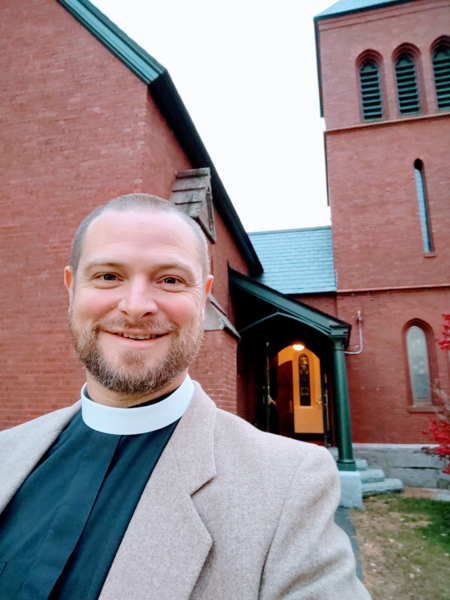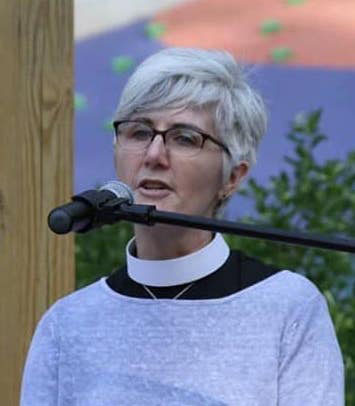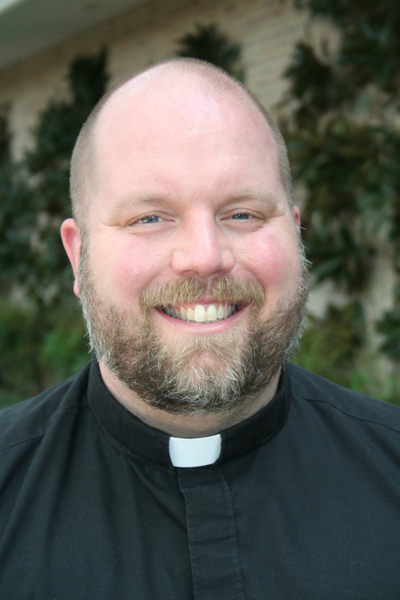Episcopal school chaplains take check-ins, self-care onlinePosted May 19, 2020 |
|
[Episcopal News Service] Life has been disrupted, including at American schools, most of which have closed their buildings and shifted to distance learning until further notice. Amid loss, fear and turmoil, “people are really wrestling with the question of ‘where is God in all of this,’” the Rev. Dan Heischman, executive director of the National Association of Episcopal Schools, or NAES, recently told Episcopal News Service. “It’s a very important time to be able to have someone who’s comfortable and … is nurtured in the questions, the discussions about God.”
Episcopal schools have such people on staff: school chaplains. Heischman said chaplains are a hallmark of Episcopal schools, even as students become more religiously diverse. Nationwide, 15% to 20% of Episcopal school students are Episcopalians, while 80% to 85% includes students with other or no religious background, he added.
School chaplains minister not only to Christians but to the whole community, Heischman said — and not just to students either. School chaplains provide pastoral care to families, faculty and staff. At boarding schools, “they’re all in,” he said, serving multiple roles and living on campus. The Rev. Nate Bostian, school chaplain at TMI Episcopal (see below for more), described himself as “the village vicar.”
This pandemic is an unprecedented situation that’s creating deep needs. It’s something no clergyperson has trained for or lived through, Heischman said. Nonetheless, school chaplains are “doing incredibly creative and pastorally sensitive things right now,” he said.
Now, as administrators puzzle over fall learning options and as much-needed time off during summer vacation hangs in the balance, self-care is particularly critical for chaplains, whose focus for the past two months has been other people’s welfare.
People crave certainty, Heischman said. “And we don’t know. And there’s no way we can know at this point.” Those unanswered questions will remain for a while. “It’s never been more important to be doing ministry,” he said.
Recently, Episcopal News Service spoke with three school chaplains — the Rev. Joshua Hill, the Rev. Jenifer Gamber and TMI Episcopal’s Bostian — to hear about their experiences as school chaplains during the coronavirus pandemic.
The Rev. Joshua Hill, Holderness School, Holderness, New Hampshire
In a video posted to YouTube, the Rev. Joshua Hill, school chaplain at Holderness School, sits in a room with recessed lighting and a bookcase behind him. “I want to play you a song,” he says, lifting his right index finger. Wilco’s “Radio Cure” begins to play, and Hill bops his head. His chin sways, and then he lip-syncs: “Oh distance has no way of making love understandable.” Star Wars-style, the yellow-lettered lyrics scroll upward from the bottom of the screen toward the chaplain’s face, and then disappear.
When the music quiets, Hill, who lives on the Holderness campus, talks about the pain of not being able to embrace one another, to eat together, or to play sports. It makes him think about Holy Communion, he says, God’s physical presence through Jesus — and that maybe it’s OK to long for physical connection right now. This, Hill’s April 29 video blog, or vlog, offers a lament to Holderness’ dispersed school community.
Hill started the vlog on March 17, when Holderness’ students, 85% of whom board at the school, were on spring break. The World Health Organization had recently declared the coronavirus a global pandemic. “I just kind of had a heavy heart, and I wanted to connect with the community,” Hill said. “I didn’t have a pulpit, and the vlog gave me an opportunity to just sort of reach out to people and to offer my thoughts.”
Students didn’t return from break. Instead, they stayed home, where they’ve been learning online since April 9. Like other boarding school chaplains, Hill doesn’t just provide several chapel services each week. He also chairs the theology and religious studies department, advises eight students and sits on the academic committee. He leads camping trips, takes students to the hospital if they’re injured and attends school sporting events. “My role as chaplain is really rolled into the fabric of every aspect of the community here,” Hill explained.
With students at home, the fabric of school life has unraveled a bit. “Right now, I think a big part of my role as chaplain is helping the administration here see that academics is not the most important thing. What we need to be focused on is the basic needs of our kids,” he said, noting Holderness’ strong focus on mental and physical health. It’s about adjusting expectations, actively seeking out kids in distress. When the Holderness team finds someone who’s struggling, it’s “lots of communication, and lots of support” to that teen from teachers, coaches and counselors.
At the same time, “I do look after the faculty and staff as much as, if not more, than the students,” Hill said; they have their own “serious needs” in addition to, or because of, the coronavirus crisis.
For now, chapel is on hiatus. “We’re still figuring it out,” Hill said. For many, Holderness is both their academic and spiritual home, so he’s continued his vlog. Whether with Wilco lyrics, a beautiful tree and Buddhist thought, or next to a “Pavement Ends” road sign, Hill offers reflection and humor. “I wanted to maintain a sense of connection to the spiritual dimension of life right now for our faculty and staff, kids and parents, and give them a place where they could have a touchpoint,” he said.
“We’re all grieving,” he said. Some kids thought they’d return to finish the school year on campus. That said, “it’s not just grief for students, but for faculty. … We really need to understand [this] as a process of grief and not run away from the feelings, but to feel them and to learn from them and grow.”
The Rev. Jenifer Gamber, St. Patrick’s Episcopal Day School, Washington, D.C.
Since St. Patrick’s Day School transitioned to distance learning, the school’s associate rector and day school chaplain, the Rev. Jenifer Gamber, sends out prerecorded chapels each week, custom-made for each of the school’s age groups. Before the pandemic, Gamber led St. Patrick’s youngest chapelgoers in a “five-finger prayer,” in which each finger represents the different people in kids’ lives. She’s incorporated the prayer into virtual chapels, and “I have been given photographs by parents of their children in the pose of prayer,” Gamber said. “The kid’s watching the video, and he’s got his hands in the five-finger position. For some of those parents, it’s the first time that they’ve seen their children pray.”
The images affirm that Gamber’s efforts to build a strong virtual chaplaincy program are paying off and finding an audience among St. Patrick’s 481 students, in nursery school through eighth grade. Gamber has kept up school worship by creating three virtual chapels each week (one each for nursery school, lower school and upper school) with the current reality in mind: She hopes the nursery school chapel will give parents some time to work, if that’s helpful, and she’s lessened upper school kids’ role in creating chapels as they manage a heavier workload in a new learning context. “It’s like producing a movie,” Gamber said. Much of the footage is of Gamber, but her videos include student chapel talks and singing music teachers. Once everything’s recorded, the chaplain has 90 minutes of footage to weave and edit into spiritual sustenance. “And so now I’m a video producer. I never in my life thought I would be doing this,” she said.
Gamber does so to maintain familiarity and predictability for the school community, even as “we’re learning what remote chaplaincy means,” she said. Her work now is driven largely by a desire to create new channels of communication with staff, faculty, students and families, “so that when something happens and our people [are] experiencing grief, that those channels are established” enough that people will reach out for support, she explained.
In that spirit, Gamber launched “St. Patrick’s Made Whole,” a weekly e-newsletter with a video and a reflection from Gamber or one of the school counselors. It also includes a curated list of secular and spiritual resources for coping and fun, and a segment called “Some Good News: St. Patrick’s Edition,” in the spirit of the actor John Krasinski’s near-eponymous new web series. The focus, which varies weekly, has included humor and self-care. “The purpose … is to equip parents as well as provide some place of continued hope and celebration,” Gamber said.
Gamber teaches and continues to do so. She also has remained available for pastoral care and prayer, but in a way that no longer fits neatly into her old school schedule. COVID-19 has affected the St. Patrick’s community, creating personal challenges. People are contacting her for support at new times. “I wouldn’t say it’s a ton of people … but there’s no container for it anymore” she said. “And so people are letting you into their lives in an immediate way; [there’s] a closeness that’s developed.”
The Rev. Nate Bostian, TMI Episcopal, San Antonio, Texas
Many people don’t think of the few minutes between school classes as sacred. But for the Rev. Nate Bostian, that time used to fill quickly with clergy-specific moments. “Let’s say I’m going from second period to third period. … I might have three or four pastoral contacts with people,” he said. “Somebody has a question outside of chapel, somebody has an aunt they want me to pray for, somebody wants to schedule a time to talk. All of that might happen super-fast, just in a span of just a few minutes from one class to another.”
Nowadays, those questions and requests come through texts, emails and phone calls; he’s getting more of those than he used to. But still, Bostian is certain that the number of remote requests doesn’t equal the care he could provide in person; not as much is revealed through a screen as it was in the hallway.
Since TMI Episcopal’s 484 sixth through 12th graders (most are day students, with some eighth through 12th graders boarding there) began online schooling the week of March 23, Bostian, who is the school’s chaplain, has thought a lot about keeping TMI Episcopal’s community well. He has a bird’s eye view of school life from which to do so. “I wear probably four or five main hats,” he said, including teaching, leading the religion department and serving on the senior leadership team. He and his family also live in one of the dorms.
Soon after the specifics of distance learning were outlined, Bostian focused on daily chapel. “We still had 20, 30 seniors that still needed to give their senior chapel talks before the end of the year, so I put that together,” he said. Now, chapel takes place daily for 10 to 15 minutes in real time, offering reflection before the day’s prerecorded chapel talk begins.
“And then the other thing was to make sure that, especially with our faculty, they were feeling safe, that they were feeling not overwhelmed, that they had the emotional and spiritual support that was needed,” Bostian said. To that end, the leadership team identified faculty living alone or with circumstances that felt concerning in the new context, and Bostian and the school counselor have been checking in with them. He knew that, for all members of the school community, loneliness could be a problem and that — with many parents who are medical professionals or business owners — illness and financial troubles could creep in.
More than anything, he thinks about how the coronavirus pandemic has erased relational structure. “You’re sitting in a chair, and the chair has legs on it, and the legs would be … a daily schedule; there’s people you meet and you have to interact with face to face; there’s certain duties and responsibilities that you have to do like homework,” he said. “And basically the coronavirus has swept out at least three of those legs from your chair, and so how do you have balance now?” He knows some kids are struggling and is part of a two-person effort to reach out to them.
And he follows a self-care regime. “I have an ongoing therapeutic relationship with a therapist who’s also another Episcopal priest,” Bostian said, as well as strong ties to other school chaplains through NAES. He keeps a routine, and his oft-repeated advice is that others do the same. “Having a daily schedule, I think, including the Daily Office … is essential,” he said. Being in prayer or meditation is key, as is exercise. “I would be crazy if I wasn’t able to go out into my garage and lift weights, which is my Zen place.”
– Heather Beasley Doyle is a freelance journalist, writer and editor based in Massachusetts. She has previously written about education and racial reconciliation for Episcopal News Service.




Social Menu